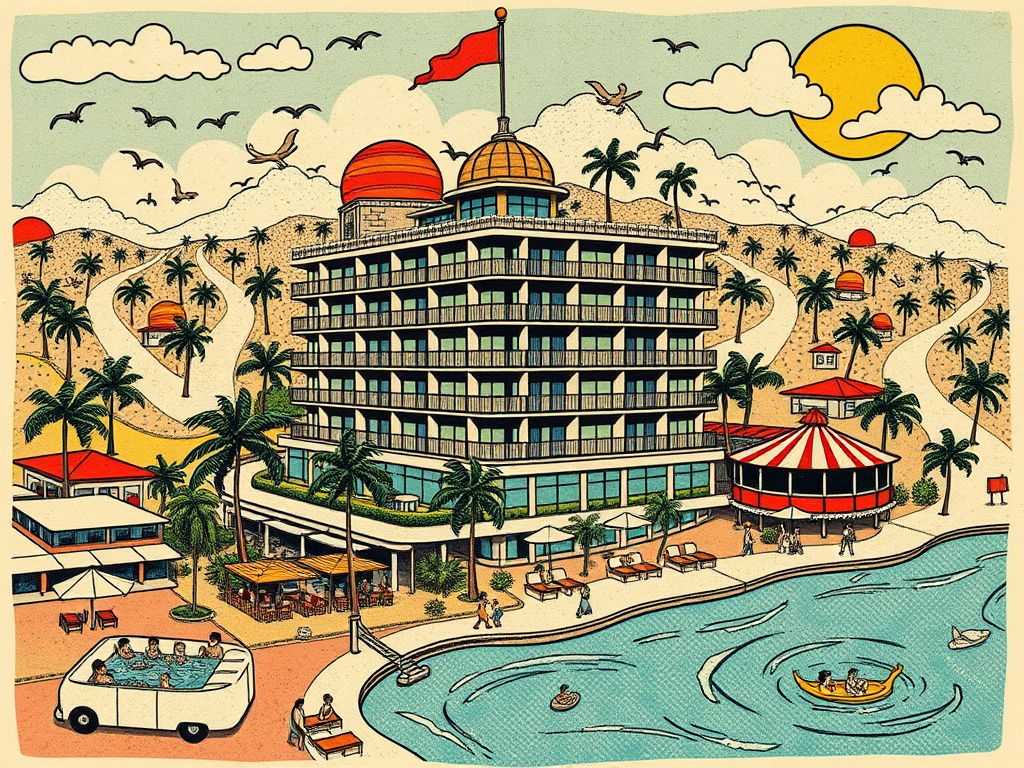
Hotel and Resort Development in Greece: Capitalizing on Tourism Growth
Table of Contents:
- Introduction
- The Greek Tourism Landscape
- Investment Opportunities in Greek Hospitality
- Key Factors Driving Hotel and Resort Development
- Challenges and Considerations
- Sustainable Tourism and Eco-Friendly Developments
- Government Initiatives and Support
- Case Studies: Successful Hotel and Resort Projects
- Future Outlook for Greek Tourism
- Conclusion
- FAQs
Reading time: 12 minutes
1. Introduction
Greece, with its rich history, stunning landscapes, and vibrant culture, has long been a coveted destination for travelers worldwide. As the country continues to experience a surge in tourism, the hotel and resort development sector presents lucrative opportunities for investors and developers. This comprehensive analysis delves into the intricacies of the Greek hospitality market, exploring the factors driving growth, potential challenges, and the promising future that lies ahead for those looking to capitalize on this burgeoning industry.
2. The Greek Tourism Landscape
Greece’s tourism sector has shown remarkable resilience and growth in recent years, despite global economic challenges. In 2019, the country welcomed a record 34 million international visitors, contributing significantly to its GDP. While the COVID-19 pandemic temporarily disrupted this upward trend, Greece’s swift recovery and adaptive measures have positioned it as a prime destination for post-pandemic travel.
Key tourism statistics:
- 34 million international arrivals in 2019
- €18.2 billion in tourism revenue (2019)
- 20.8% contribution to GDP (2019)
- Projected 5.5% annual growth rate in tourism (2023-2027)
3. Investment Opportunities in Greek Hospitality
The robust growth in Greek tourism has created a fertile ground for hotel and resort development. Investors are increasingly recognizing the potential for high returns in this sector, particularly in popular destinations such as the Greek Islands, Athens, and emerging hotspots along the mainland coast.
3.1 Types of Investment Opportunities
- Luxury resorts and villas
- Boutique hotels in historic locations
- Eco-friendly accommodations
- Mixed-use developments combining hotels with retail and residential spaces
- Renovation and rebranding of existing properties
Investors seeking to enter the Greek hospitality market may also consider the greece investment visa program, which offers residency benefits for qualifying investments in real estate, including hotel and resort properties.
4. Key Factors Driving Hotel and Resort Development
Several factors contribute to the increasing attractiveness of hotel and resort development in Greece:
4.1 Growing Tourist Demand
The consistent rise in international arrivals, coupled with a diversification of source markets, has created a need for additional and varied accommodation options. Luxury and experiential travel segments, in particular, are showing strong growth potential.
4.2 Infrastructure Improvements
Significant investments in transportation infrastructure, including airport expansions and upgrades to road networks, have enhanced accessibility to various regions of Greece, opening up new areas for development.
4.3 Favorable Investment Climate
The Greek government has implemented various measures to attract foreign investment, including tax incentives, streamlined permit processes, and the aforementioned investment visa program.
4.4 Extended Tourism Season
Efforts to promote Greece as a year-round destination have been successful, leading to increased demand for accommodations beyond the traditional summer months.
5. Challenges and Considerations
While the opportunities in Greek hotel and resort development are abundant, investors must also be aware of potential challenges:
- Bureaucratic processes and complex regulations
- Environmental concerns and restrictions in certain areas
- Seasonal fluctuations in demand
- Competition from established properties and international chains
- Potential economic instability and geopolitical risks
6. Sustainable Tourism and Eco-Friendly Developments
Sustainability has become a crucial factor in the Greek tourism industry, with both the government and consumers placing increased emphasis on environmentally responsible practices. Developers who incorporate sustainable design elements and eco-friendly operations into their projects are likely to gain a competitive edge in the market.
6.1 Sustainable Development Practices
- Energy-efficient building designs
- Water conservation systems
- Use of renewable energy sources
- Locally sourced materials and labor
- Preservation of natural habitats and cultural heritage sites
7. Government Initiatives and Support
The Greek government has recognized the importance of the tourism sector and has implemented various initiatives to support its growth and development:
- Fast-track licensing procedures for strategic investments
- Tax incentives for large-scale tourism projects
- Public-private partnerships for infrastructure development
- Marketing campaigns to promote Greece as a diverse, year-round destination
- Training programs to enhance the skills of the hospitality workforce
8. Case Studies: Successful Hotel and Resort Projects
Examining successful hotel and resort developments can provide valuable insights for potential investors. Here are two notable examples:
8.1 Costa Navarino, Peloponnese
This luxury resort complex has set new standards for sustainable tourism development in Greece. Featuring multiple hotels, golf courses, and extensive leisure facilities, Costa Navarino has successfully balanced luxury tourism with environmental conservation and community engagement.
8.2 Santorini Sky, Santorini
This boutique luxury villa resort showcases how developers can create unique, high-end experiences in popular destinations. By focusing on privacy, personalized service, and stunning views, Santorini Sky has carved out a niche in the competitive Santorini market.
9. Future Outlook for Greek Tourism
The future of Greek tourism looks promising, with several trends shaping the industry:
- Continued growth in luxury and experiential travel segments
- Increasing demand for sustainable and eco-friendly accommodations
- Development of new destinations beyond traditional hotspots
- Integration of technology in hotel operations and guest experiences
- Focus on wellness and health tourism
These trends present opportunities for innovative hotel and resort concepts that cater to evolving traveler preferences while maintaining Greece’s unique cultural and natural appeal.
10. Conclusion
Hotel and resort development in Greece presents a compelling opportunity for investors looking to capitalize on the country’s thriving tourism industry. With strong growth projections, government support, and increasing demand for diverse accommodation options, the Greek hospitality sector is poised for continued expansion.
However, success in this market requires careful consideration of various factors, including location selection, sustainability practices, and regulatory compliance. Investors who can navigate these challenges while offering unique, high-quality experiences to visitors are well-positioned to reap substantial rewards in this dynamic and evolving market.
As Greece continues to solidify its position as a premier global tourism destination, the potential for innovative and successful hotel and resort developments remains high. By leveraging the country’s natural beauty, rich culture, and improving infrastructure, investors can play a crucial role in shaping the future of Greek tourism while generating attractive returns on their investments.
FAQs
1. What are the main advantages of investing in hotel and resort development in Greece?
The main advantages include strong tourism growth, government support through incentives and streamlined processes, potential for high returns, and the opportunity to participate in a diverse and evolving market with year-round appeal.
2. How does the Greece investment visa program benefit hotel developers?
The Greece investment visa program offers residency benefits to qualifying investors, potentially making it easier for international developers to manage their projects and stay connected to the local market.
3. What are some emerging trends in Greek hotel and resort development?
Emerging trends include a focus on sustainability and eco-friendly designs, boutique and experiential accommodations, wellness-oriented resorts, and the integration of technology to enhance guest experiences.
4. How can developers address the challenge of seasonality in Greek tourism?
Developers can address seasonality by designing multi-purpose facilities that cater to different markets throughout the year, focusing on year-round attractions like wellness centers or conference facilities, and targeting diverse international markets with varying travel seasons.
5. What role does sustainability play in modern Greek hotel and resort development?
Sustainability plays a crucial role in modern Greek hotel development, with increasing emphasis on eco-friendly practices, energy efficiency, and preservation of natural and cultural heritage. Sustainable developments often enjoy competitive advantages and align with growing consumer preferences for responsible tourism.

Article reviewed by Liina Tamm, Real Estate and Investment Expert | Consultant for Commercial and Residential Properties | Market Analysis and Strategies for International Investors, on March 11, 2025
